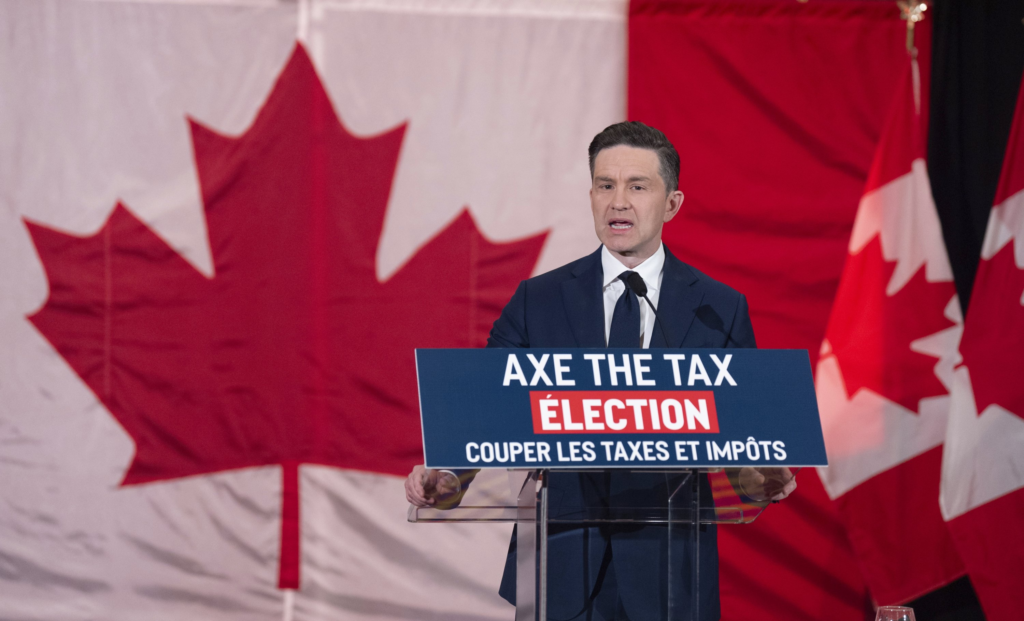Pierre Poilievre’s aggressive populist strategy initially positioned him strongly as Canada’s Conservative Party leader, appealing through anti-elite messaging and controversial stances like defunding the CBC. However, his tactics have increasingly become liabilities as the political landscape shifts. Comparisons to Donald Trump, exacerbated by Trump’s anti-Canadian tariffs and rhetoric, have significantly weakened Poilievre’s appeal. Coupled with declining poll numbers, a restrictive media strategy, and an outdated stance against climate initiatives, Poilievre now struggles to expand beyond his core base. With the April 28, 2025 election approaching, his once-effective combative approach now risks alienating voters seeking stability and unity.
Pierre Poilievre’s rise as the leader of Canada’s Conservative Party was initially propelled by his confrontational populism, tapping effectively into a wave of dissatisfaction among Canadian voters tired of the Trudeau administration. But as Canada approaches the pivotal 2025 federal election, Poilievre’s biggest selling points—his combative style, anti-elite rhetoric, and media-savvy campaigning—are rapidly evolving into critical vulnerabilities that could cost him the election.
Poilievre’s populist strategy had undeniable appeal. Central to his message was the promise to defund the Canadian Broadcasting Corporation (CBC), which he repeatedly labeled a mouthpiece for “Trudeau propaganda.” This stance resonated deeply with conservative voters who viewed the CBC’s government-funded model with skepticism. Poilievre’s effectiveness in this narrative reached its zenith when, in April 2023, he successfully persuaded Elon Musk to label the CBC as “government-funded media” on Twitter. This momentary victory bolstered his anti-establishment credibility and energized his political base.
Poilievre’s populist magic worked—until Canada needed a statesman, not a showman
Yet, the same tactic now appears increasingly tone-deaf. A broader Canadian public continues to regard the CBC as a valuable cultural institution. Recent polling from April 2025 demonstrates that 57% of Canadians oppose defunding the CBC, seeing the network as crucial for impartial news, particularly in a media landscape increasingly dominated by misinformation. Moreover, the Liberals’ promise to increase CBC funding by $150 million annually stands in stark contrast, framing Poilievre’s cuts as detrimental to Canada’s cultural and informational integrity rather than a victory against elite institutions.
Poilievre’s strategic alignment with populist movements internationally—most notably drawing comparisons to Donald Trump—has compounded his political difficulties. Initially, parallels to Trump’s rhetoric aided Poilievre by capturing the imagination of conservative and working-class Canadians disillusioned with mainstream politics. His “Canada First” slogan, echoing Trump’s “America First,” resonated with voters eager for decisive action against bureaucratic gridlock and economic stagnation.
However, this perceived alliance has dramatically backfired in recent months due to Trump’s openly antagonistic policies toward Canada. Trump’s imposition of punitive tariffs on Canadian exports and his provocative commentary, including references to Canada potentially becoming America’s “51st state,” ignited a surge of nationalistic backlash across Canada. This unexpected geopolitical shift has significantly weakened Poilievre’s appeal, with Canadians increasingly wary of politicians perceived to be too accommodating to American pressures. An Ipsos poll from March 2025 notably reveals that 43% of Canadians fear Poilievre would acquiesce too readily to U.S. demands under Trump, compared to only 31% for Liberal leader Mark Carney.
Poilievre’s confrontational, often hostile stance toward traditional media also appears increasingly unsustainable. Early on, his combative media interactions—including viral moments like his defiant apple-eating exchange with a journalist—effectively demonstrated his toughness and directness. However, his subsequent approach, which has included tightly restricting media access and openly dismissing reporters as “protesters,” has diminished rather than bolstered his image. The tactic that once portrayed strength now looks defensive, suggesting insecurity and an unwillingness to engage transparently with scrutiny. Analysts now widely regard this strategy as self-defeating, particularly amid rising public concerns about democratic transparency.
When your brand is built on confrontation, compromise starts looking like defeat
Poilievre’s decline is starkly reflected in recent polling data. In January 2025, Conservatives enjoyed a commanding 25-point lead over the Liberals. Fast forward to April, and the Conservatives find themselves trailing the Liberals by eight points in numerous polls. This precipitous drop is not merely statistical noise but reflects a seismic shift in voter perception triggered by several critical developments.
First, Justin Trudeau’s resignation significantly altered Canada’s political dynamics. Poilievre had built much of his political capital on opposing Trudeau personally, exploiting his controversies and positioning himself as Trudeau’s diametric opposite. Trudeau’s departure removed this straightforward antagonist, exposing Poilievre’s policies and personality directly to scrutiny. This exposure coincided with the ascent of Mark Carney, whose calm, technocratic demeanor starkly contrasts Poilievre’s aggressive populism. Carney’s moderate, stable image appeals widely to Canadians anxious about economic stability, especially amid ongoing U.S.-Canada trade tensions.
Secondly, Poilievre’s flagship economic proposals, intended as proof of his fiscal conservatism, now appear less compelling. His plans to cap government spending and significantly cut foreign aid, directing savings toward tax deferrals on capital gains estimated at $10.5 billion over two years, initially attracted conservative voters. But, amidst growing economic uncertainty prompted by U.S. tariffs and global financial instability, these measures increasingly look like risky gambles rather than prudent economic stewardship. Voters now question whether Poilievre’s ideological commitment to shrinking government aligns with pragmatic economic necessity.

Thirdly, his staunch opposition to carbon pricing and climate initiatives, captured in the popular slogan “Axe the Tax,” has begun alienating an electorate increasingly concerned about environmental stability. Extreme weather events in recent years have heightened public sensitivity to climate issues. By steadfastly opposing carbon pricing, Poilievre risks appearing out of touch with evolving public sentiment. According to recent surveys, a clear majority of Canadians—62%—now support climate initiatives, viewing them as essential rather than elitist luxuries.
Poilievre’s declining fortunes underscore the paradox of his populist approach. Aggressive rhetoric and confrontational postures are politically powerful tools but highly situational. They thrive in specific contexts—particularly amid widespread dissatisfaction and against easily identifiable adversaries like Trudeau—but falter rapidly when the underlying dynamics change.
Canadians wanted clarity; Poilievre delivered controversy
His alignment with Trumpian rhetoric, initially effective, now serves as a stark reminder of the dangers populist movements face in international politics. The resurgence of Canadian nationalism, sparked by external threats rather than internal elites, has caught Poilievre flat-footed. His approach, inherently divisive and combative, struggles in environments demanding unity, stability, and diplomatic subtlety. Thus, as the geopolitical and domestic landscapes shift, Poilievre’s political liabilities multiply.
Ultimately, Pierre Poilievre finds himself trapped in a political identity he cannot easily escape. His confrontational approach that initially brought him prominence now increasingly appears polarizing, risky, and unsuited to current national needs. While his core supporters remain energized, his inability to expand beyond this base suggests a potential ceiling on his broader appeal.
As Canadians head toward the polls on April 28, 2025, the choice they face is becoming clearer: to endorse Poilievre’s combative populism, risking further national division and vulnerability, or to opt for a steadier, more consensus-driven political path. In the face of evolving challenges at home and abroad, Poilievre’s biggest selling points may have already become insurmountable obstacles to his electoral success.
References and Further Reading
- Politico: Pierre Poilievre’s campaign strategy and challenges, including his association with Donald Trump and media tactics.
- CBC News: Poilievre’s proposal to defund the CBC and its implications for broadcasting laws.
- Al Jazeera: Overview of Pierre Poilievre’s political rise, populist messaging, and current challenges in the election race.
- CBC News: Analysis of Poilievre’s anti-elite populism and its impact on his leadership campaign.
- CBC News: Polling data showing the Conservatives trailing the Liberals and skepticism among Poilievre supporters regarding poll accuracy.
- CTV News: Nanos Research polling data highlighting the Liberals’ lead over Conservatives and regional breakdowns.
- CBC News: Poilievre’s restrictive media access policy during his campaign and its implications.
- Policy Magazine: Conservative campaign strategy limiting media access, reflecting historical practices under previous Conservative leadership.











